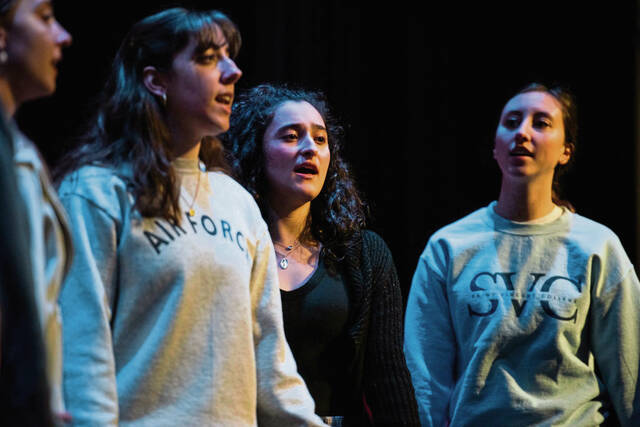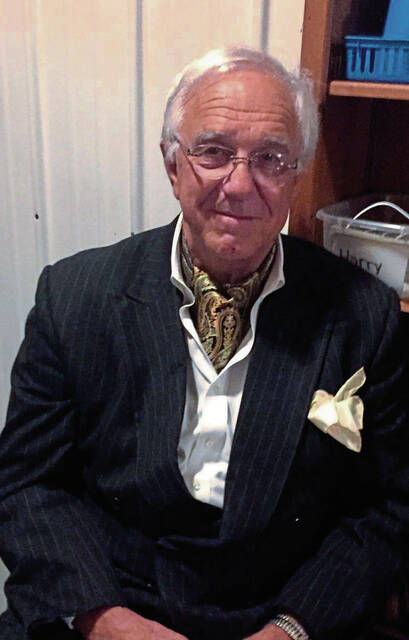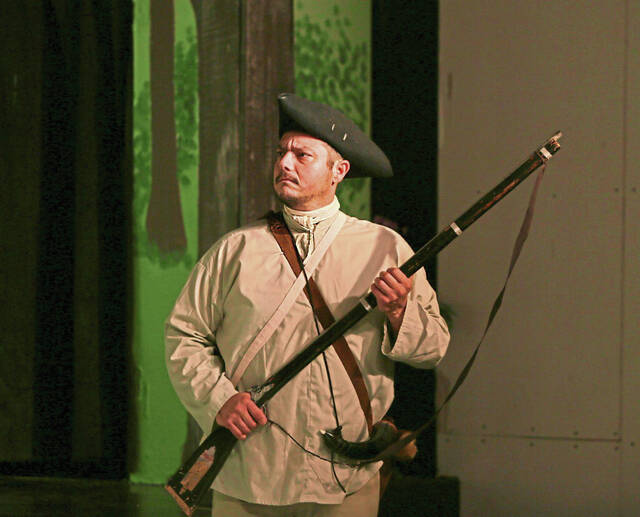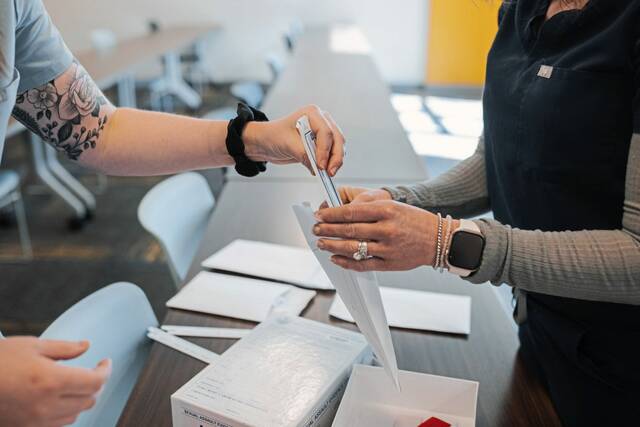Ready to go on at a moment’s notice, some actors and actresses wait in the wings.
They are in the theater in case one of their colleagues can’t take the stage because of illness, a family emergency or a scheduled day off. They often are referred to as “unsung heroes” because their names might not be displayed in lights on the marquee or featured in the playbill — but their presence is invaluable.
The pandemic has increased the visibility of these individuals, according to those in the theater community. Positive covid tests have required someone to step in, sometimes at a moment’s notice.
A standby is someone who learns a specific role of a title character or principal part such as Elphaba in “Wicked,” while an understudy essentially refers to someone covering a role or several roles in a nonmusical play. Sometimes they are part of the ensemble or cast.
A swing refers to a member of the company who understudies several ensemble roles. These ensemble roles are called “tracks.” The only time a swing performs is if an ensemble member is out of the show or is covering another role in the show, as many ensemble members also have understudy duties, according to the New York Theatre Guide.
“It takes a unique mind to be an understudy, standby or swing,” said Gregg Brandt, producing artistic director for Saint Vincent Summer Theatre in Latrobe. “You have to stay focused.”
Brandt was a swing for the national tour of “Les Miserables” while his son, Eddie, was the boy character Gavroche. Before that, Gregg Brandt was a dance captain for “Les Miserables,” someone who knows all the choreography. He was responsible for giving the production team’s notes and keeping the scenes the way they were intended to be staged. Brandt currently is directing Saint Vincent students for “Once Upon a Mattress,” which will be performed Feb. 23-26 in the Robert S. Carey Center in Latrobe.
Ava Adams, a freshman studying communication at Saint Vincent, is an understudy for the character Winifred.
“I find it very rewarding because how I learn is by watching and observing,” Adams said. “I view the role of an understudy as one of patience. It’s about continuing to work hard behind the scenes and to believe in yourself. Something good will come of it, if you put the time into something you love.”
Her classmate, Abigail McGinnis, a vocal performance major, is the understudy for Lady Larkin.
“It’s been a really interesting experience for me,” McGinnis said. “It’s a little scary because I am not studying the character as in-depth as the girl in the role, because I have another role. But I know there could be a possibility I would have to quickly change things up.”
Artists’ appreciation
Actors and actresses at all levels appreciate understudies, swings and standbys, Brandt said. He spotted a social media post where actor Hugh Jackman thanked Kathy Voytko, who stepped in for leading lady Sutton Foster in “The Music Man.”
“Hugh respected and appreciated the job she did,” Brandt said. “We all depend on these people who come to the theater prepared to go on. They bring a different energy to the cast.”
That unique energy is what inspires Ben Cherington, a 2020 Carnegie Mellon University graduate. He often walks to the front of the theater to see people lined up to buy tickets at the box office.
“You can see how much a show means to people in the audience,” said Cherington, whose family has Pittsburgh roots. “It is one of those things you really can’t know until you are doing it, because every experience is so different.”
Touring with “Les Miserables” as a swing, he said there are no egos and that the entire company is excited when you get your turn to go on stage.
“It’s my job to replicate, but not be a machine, and to bring an element of my style to the performance,” said Cherington, who also has performed with the Pittsburgh CLO. “I will be different than the person I am on for, but the framework is still the same.”
Time to shine
Cherington said the first time he got to go on, he had a few hours’ notice. He was able to arrive early and ask questions.
“You always have to be ready,” he said. “There is a lot to know, and not just on stage but backstage and with costumes and props. The biggest compliment anyone can pay you is to say they didn’t realize you were there. That means it was a seamless transition.”
The pandemic has affected these roles, according to Rick Edinger, chair of acting and musical theater at Carnegie Mellon University. When shows returned in the summer of 2021, everyone was regularly tested for covid-19.
“If someone wasn’t feeling well, it was OK to stay home,” Edinger said. “That created even more opportunities for standbys, understudies and swings. It can be stressful for them. They don’t rehearse much once a show opens. They are a big part of the team behind the scenes.”
They certainly are a team, agreed Gordia Hayes, a swing for “The Tina Turner Musical,” coming April 4-9 to the Benedum Center in Downtown Pittsburgh as part of the Pittsburgh Cultural Trust’s PNC Broadway series. Hayes can cover all of the male ensemble roles. He said it is important to also study the inner workings of what happens backstage.
“To me, the most exciting part is being ready at any moment to go on,” he said. “To be part of ‘The Tina Turner Musical’ is phenomenal because she is the queen of rock and roll. She is iconic. To see her come though all that adversity she faced as a woman of color is inspirational. It’s exciting, because you never know what the day is going to bring. It is challenging. I love my job.”
So does Karen “KB” Burthwright, a swing and dance captain with “The Tina Turner Musical.”
“Theater is magical,” she said. “It’s art and it transforms and affects people, and we are a huge part of that equation. We are versatile people. It is rare to find someone to do it. When the audience applauds, they are saying thank-you for all you have done. Hats off to you superheroes who keep shows going.”
A seamless transition
One is expected to know a lot of things without much rehearsal or live performances, but it’s about keeping the excitement alive and staying fresh, Burthwright said. It’s about watching everything from the audience to backstage, seeing actors’ and actresses’ entrances and exits so that the transition is as seamless as possible.
“You don’t want the show to feel different,” she said. “The best compliment anyone can give you is they never would have guessed you were an understudy or swing or standby. It’s a specialty skill to do it and to do it well.”
She has been called upon at intermission and between acts.
“You have to focus on getting the job done,” she said. “Some people thrive on doing this and love the variety because they get to do more than one role or part or track.”
While bigger productions have the luxury of having additional performers, smaller theater companies often don’t, said Tina Cerny, managing director for Prime Stage, which performs at the New Hazlett Theater on Pittsburgh’s North Side.
“In theater, you have to be prepared for anything because unforeseen circumstances arise,” she said. “Unfortunately, we’ve had to cancel a show because we lost an actor and weren’t able to find someone to step in and learn the role, or we’ve had someone fill in with a script in hand.”
Much like Prime Stage, Freeport Theatre Festival in Allegheny Township can’t afford additional talent.
“We are a community theater, so there are limited resources,” said Marushka Steele, festival founder, along with her husband, Rennick.
This past summer, when one of the actors came down with the flu, she phoned another actor who was able to step in.
“The rest of the cast gave their support, and the play moved forward,” she said. “In the theater, everyone has to accept they are dependent on everyone else. And when someone can’t be there for whatever reason, they are grateful for the person who has stepped up to help. We support each other to reach the goal of getting the performance across the finish line. It’s like a team where you need all of the players to win.”
In sickness and in health
Lisa Velten Smith, Carnegie Mellon assistant professor of voice, business of acting, and director of this year’s showcase, was an understudy for Sienna Miller’s and Marin Ireland’s characters in “Miss Julie” on Broadway. On one occasion, Miller had food poisoning. Velten Smith thought she’d go on for Miller, but she never went on for either actress.
“Sienna came in and went on, and I thought, ‘I am never going on for this woman,’ ” Velten Smith said.
Sometimes actors and actresses make it through a performance even though they aren’t feeling well. That was Al Lindsay of Buffalo Township for Freeport Theatre Festival’s “Barefoot in the Park.” He was having chest pains during a rehearsal, so he went to Allegheny Valley Hospital. Tests showed he wasn’t having a heart attack, but the doctor recommended he be admitted.
“I told him I can’t do that,” Lindsay said. “I have this play. I went to see my PCP (the next day) and told him about the incident, and he said I should go to the hospital because I am going to have a heart attack. I told him I’ve got his play and they don’t have an understudy.”
The doctor gave him nitroglycerin just in case he had chest pain, and then came to the play because he was that concerned. After the performance, Lindsay again wasn’t feeling well. He ended up having to have two stents put in. A replacement actor was found to finish the final performances.
Edinger recalled how exciting it was when it was his turn in the show “Pacific Overtures” at Studio 54 in New York City in 2004.
He got to rehearse for 45 minutes.
“It was a wild day,” he said. “I had never even tried on a costume, and someone got injured. The producer sent me a note afterward with a bottle of champagne: ‘Thank you for saving our Broadway butts.’ ”



























